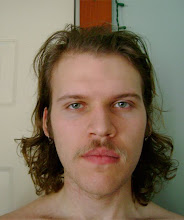Monday, March 23, 2009
Artist's Statement, super heroes & environmentalism
I use the super hero image to speak about coming to terms with a changing role in society. In our padded culture we are encouraged to stay in a perpetual state of adolescence. A good example of this is our attachment to super hero imagery. People flock to summer blockbusters about silver-age super heroes as if they'd discovered the fountain of youth, as possessed by an urge to reclaim a long-departed sense of wonder with the world. While the notion that we are somehow linked to a subversive puer eternis is a buoyant and charming thought, especially when put into context with the bleak visions of post-apocalyptic, technological wastelands perpetuated by our many entertainment outlets, our eagerness to escape into fantasies of yore speaks volumes about how we perceive personal responsibility. In The Hero with a Thousand Faces, Jospeh Campbell wrote, "the infantile fantasies which we all cherish still in the unconscious play continually into myth, fairy tale, and the teachings of the church, as symbols of indestructible being. This is helpful, for the mind feels at home with the images, and seems to be remembering something already known. But the circumstance is obstructive too, for the feelings come to rest in the symbols and resist passionately every effort to go beyond." We have created massive channels of entertainment and distraction to forget how sad or unhealthy we are, to deny the negative impact of our way of life, to shelf the premonitions for one more day of the veritable desert which our insatiable appetite really does threaten to create. Our habits of excessive consumption in this country and the systems of oppression and denial that we instigate in order to sustain this way of life are hastening our end, an end that no 6' 2" man in a cape can save us from. The triumvirate of comic books, movies, and television, which keeps the super hero alive, cares not whether we achieve the same heroism the stories describe. The stories thrive on canned ideals, dreams and sentiment, recycled for thousands of years. They exist not to inspire, but to keep us asleep. In the name of entertainment, we trade reality for an interpretation of reality. To alleviate our uncertainty, we starve ourselves of experience. So that we have security for tomorrow, we eclipse all opportunity for growth. In short, we suppress our suffering, but also our joy. If we are ever to wake up, emerge from adolescence, divest ourselves from our harmful ways to claim footing in the world, we must first realize that there are no heroes, that each of us is powerful beyond imagining, that we are responsible for that power, and that at this point in human history, the greatest gift we bear is the ability to change. (1.31.09)
Subscribe to:
Post Comments (Atom)

This is great. Is it a reworking of your college statement or have you completely gone a new route? It's been awhile so I don't remember much of the old one but I remember the Cambell references from before.
ReplyDelete